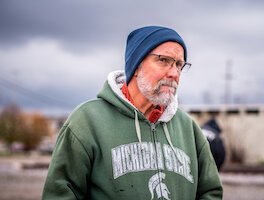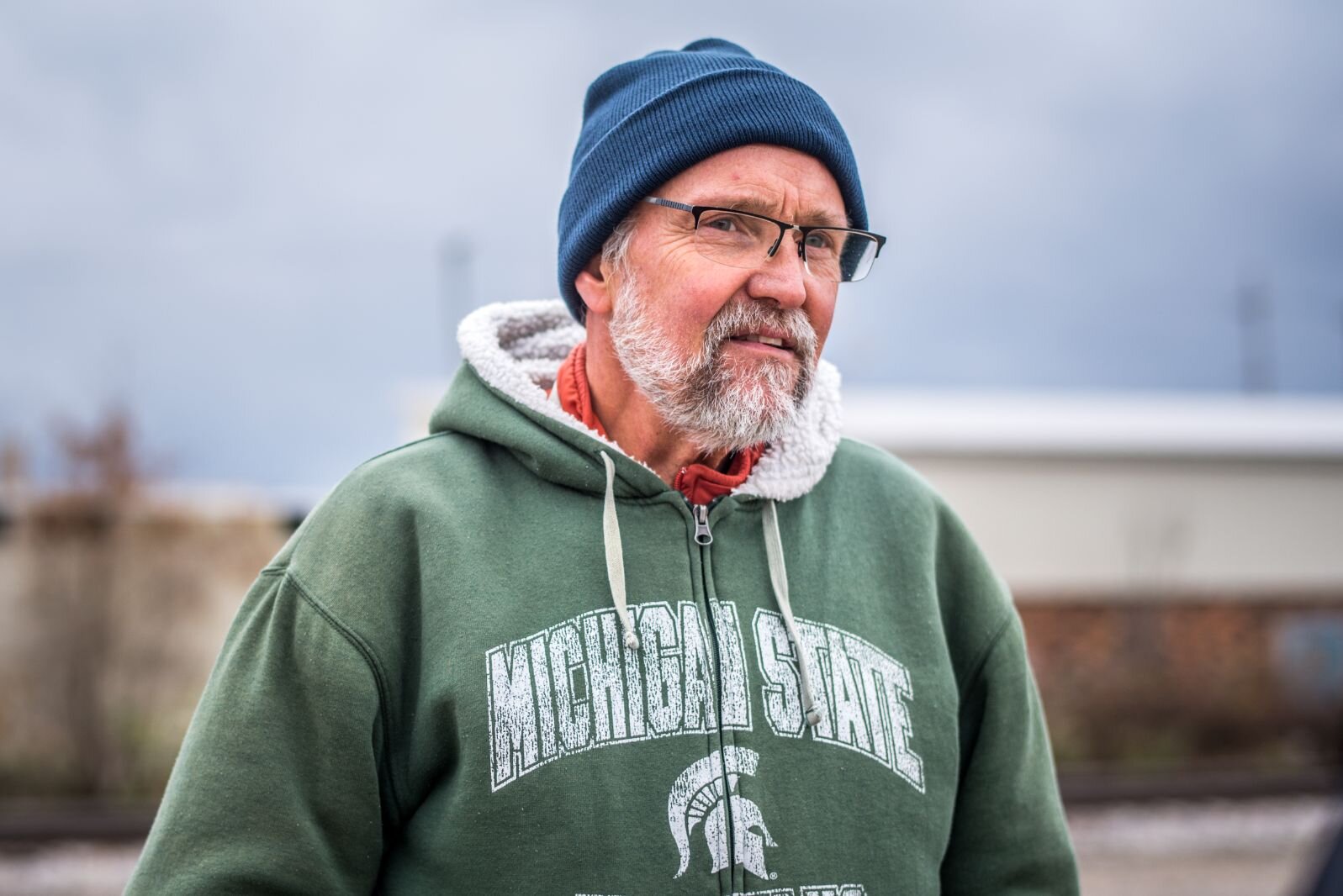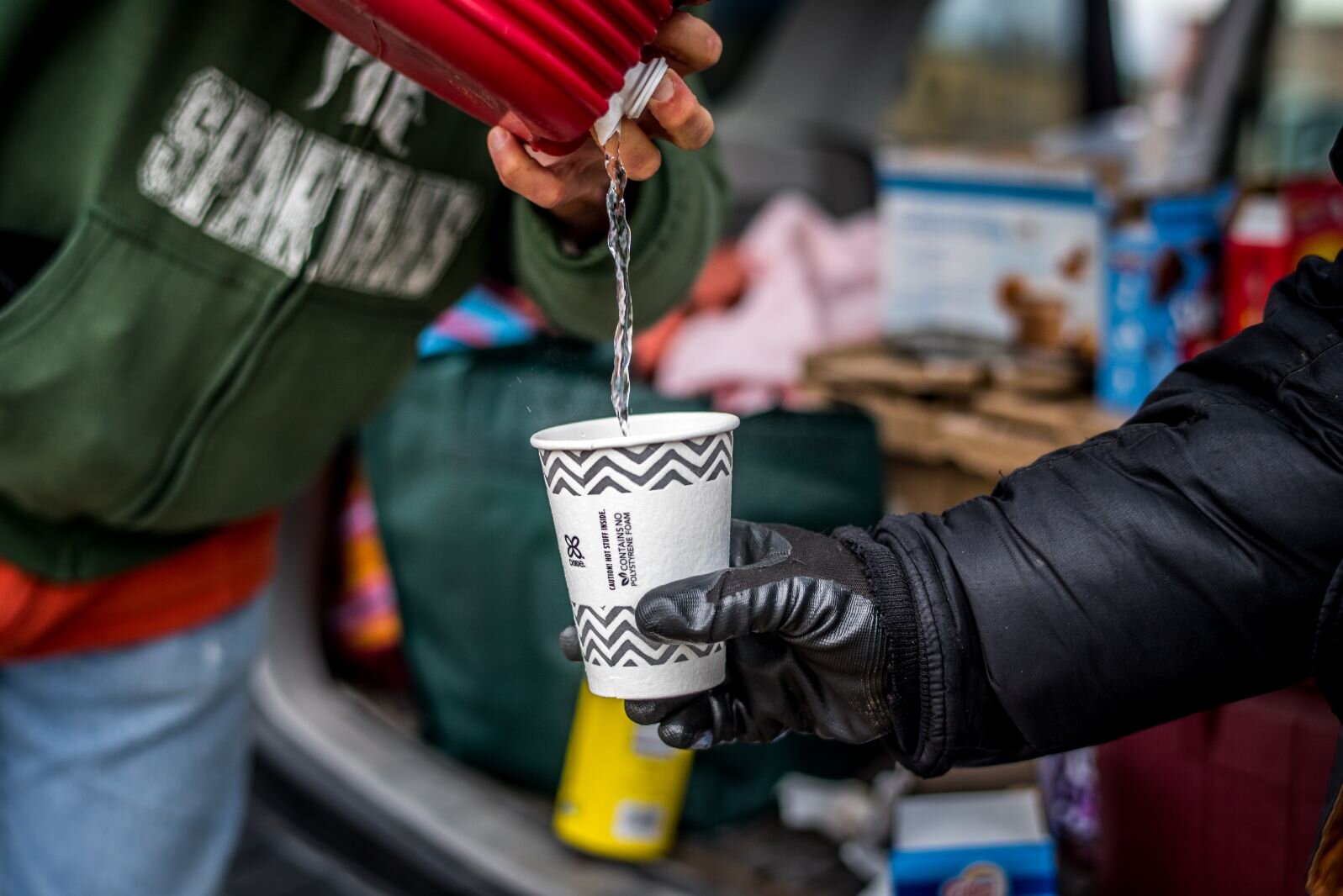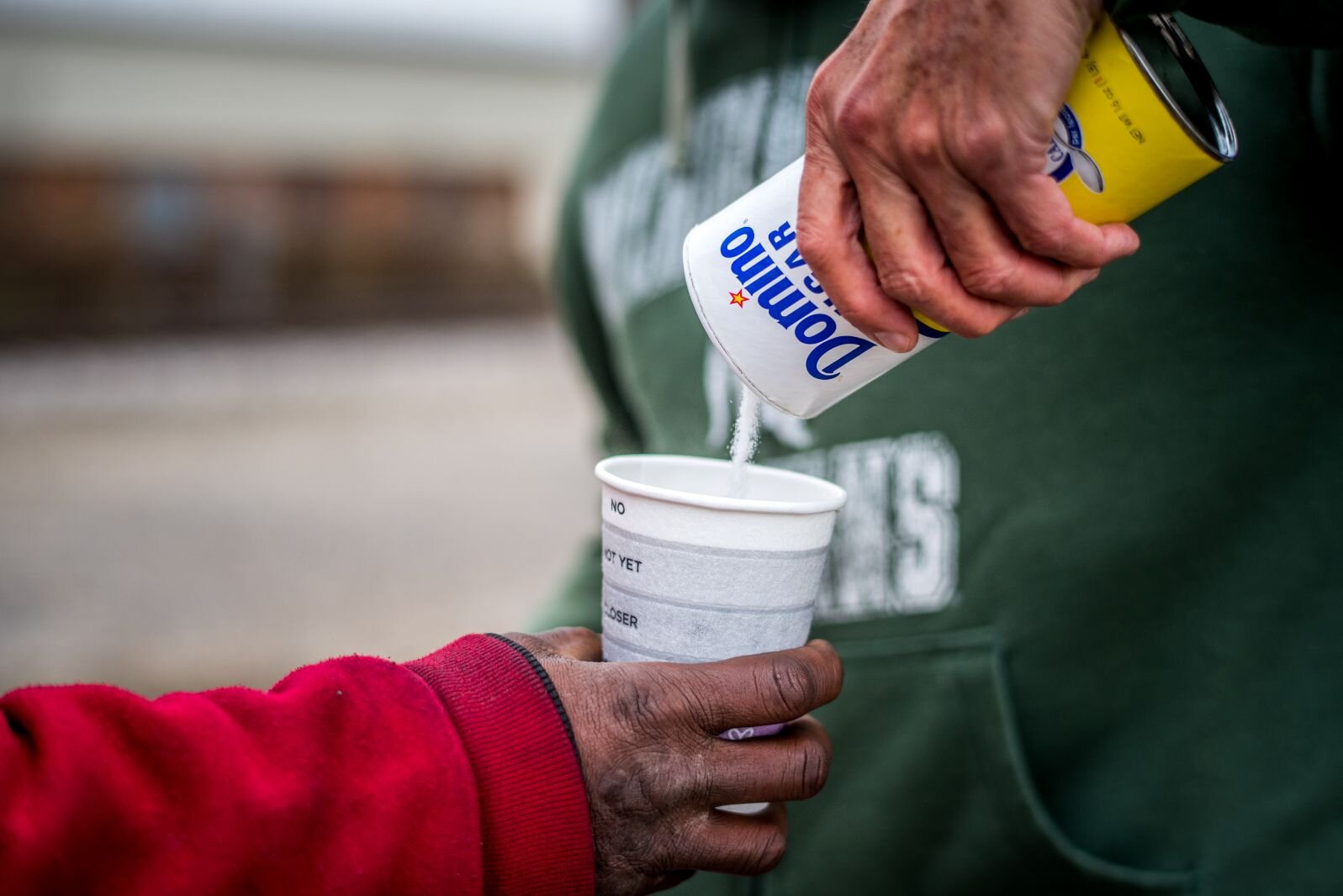“What I think is of first importance, is that they know there is someone who cares for them.” – Jan van Schaik
This story is part of Southwest Michigan Second Wave’s series on solutions to affordable housing and housing the unhoused. It is made possible by a coalition of funders including the City of Kalamazoo, Kalamazoo County, the ENNA Foundation, and LISC.
The weather had suddenly turned cold. The week before saw summer-like weather. Now, dark gray clouds were sending down a few November snowflakes.
The warming shelter was not open.
It was the Wednesday before the big snowstorm that rolled in the night of Nov. 17, which gave Kalamazoo a couple feet of snow and night temperatures in the teens over the weekend.
Jan van Schaik was expecting to help out while inside The River, but he was outside in the parking lot at Walbridge and East Willard, his car’s hatchback open, full of food, coffee, and hot chocolate.
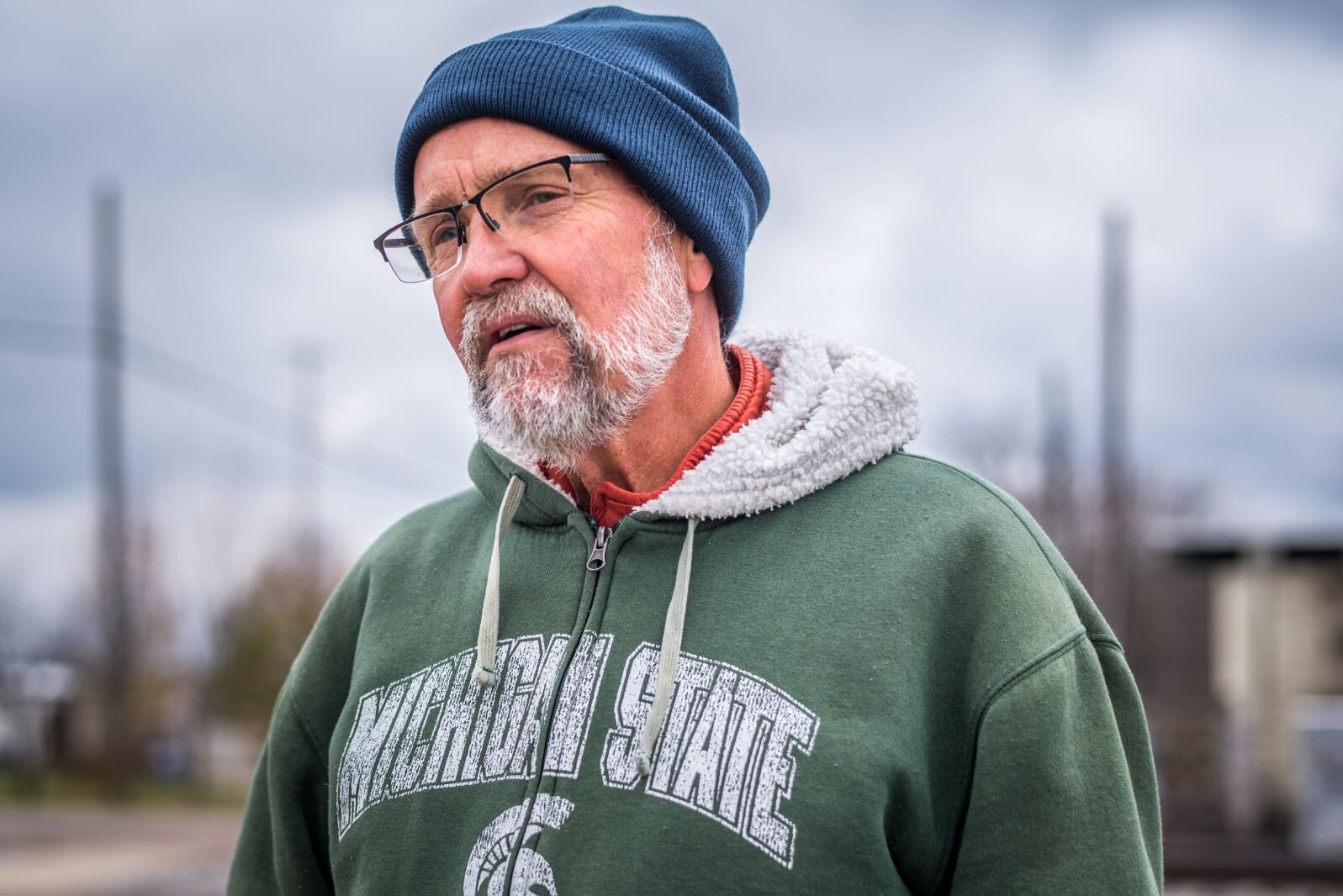
The River and Integrated Services of Kalamazoo were to team up to operate the warming shelter, but something fell through, van Schaik says “Neither of these group’s fault,” he says. Just a miscommunication.
Still, unsheltered people were coming into the area, looking for warmth. They expected something, so, “Here I am,” van Schaik says.
As we spoke with van Schaik, he paused often to do his “second job after retirement.”
Walter finishes a sandwich and takes off. “You want a bar for the road?” van Schaik calls to him. “No, I’m good. Thanks!”
Tim leaves. “You’ll be here tomorrow?” he asks. van Schaik says, “I’ll be here tomorrow afternoon.”
Jamie rolls up on a bike. “You want a peanut butter sandwich?” van Schaik says. “Yes! Those are my favorite,” she says.
“It’s so cold,” she says.
“You know there’s a snowstorm coming, okay? A big one,” he tells her.
Jamie complains about her ears freezing. She was hoping to get inside at the promised warming shelter and van Schaik lets her know the Salvation Army has a warming center, but it’s only open Tuesdays and Fridays.
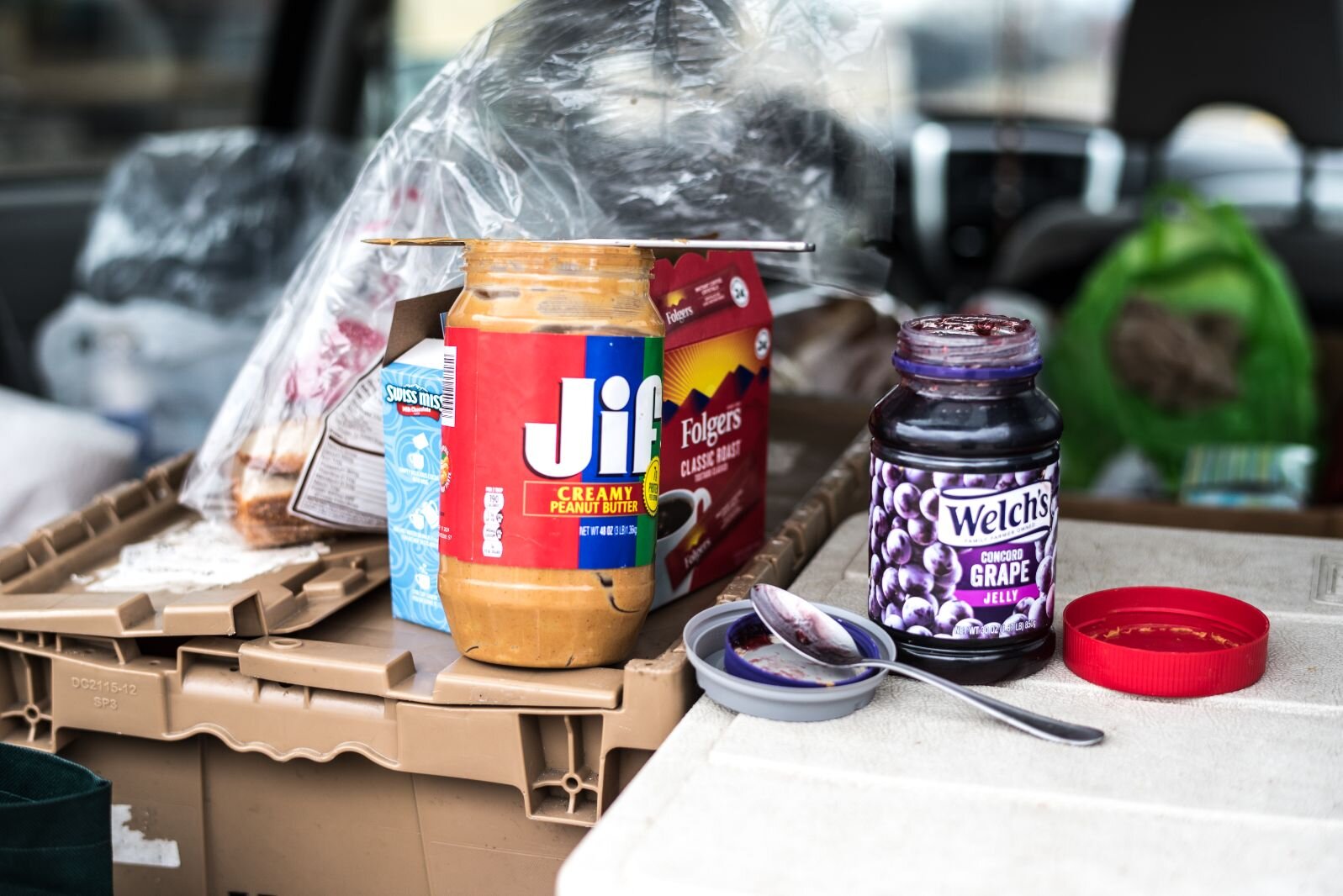
“So here I am. And I have no idea what I’m doin’, other than just smiling.”
We heard of van Schaik’s work from Pops. Earlier this year, Pops was living outside, hoping to kill himself with drugs. But van Schaik came along, got Pops into rehab, and put him in a room in his own house.
“He was out cold, on the rocks,” van Schaik says, pointing towards a gravel lot by the PFC. “He’s passed out, spread-eagled. It was a good warm day. I put a water bottle in one hand, and a granola bar alongside of him.”
A few days later he saw Pops again. “We got to talking. He’s one of the people who told me he wanted to get off the streets.”
Of his work with Pops, he says, “That was a whole trip and a half. I know nothing about this stuff. By training, I’m a statistician. So I have no skills, no experience with addiction, anything like that.”
“He went to rehab, there were some hiccups there, but he got through that. There were some hiccups with his transitional sober living home. Rather than throw him back on the streets, he came to my place,” he says.
“He needs to get his sea legs underneath him, and he’s working on that. He’s got a deadline, he knows it. And hopefully, he’ll have a place to stay. He’s got a job.” Van Schaik’s adult children are coming home for the holidays, “So I need the bedroom,” he says with a laugh.
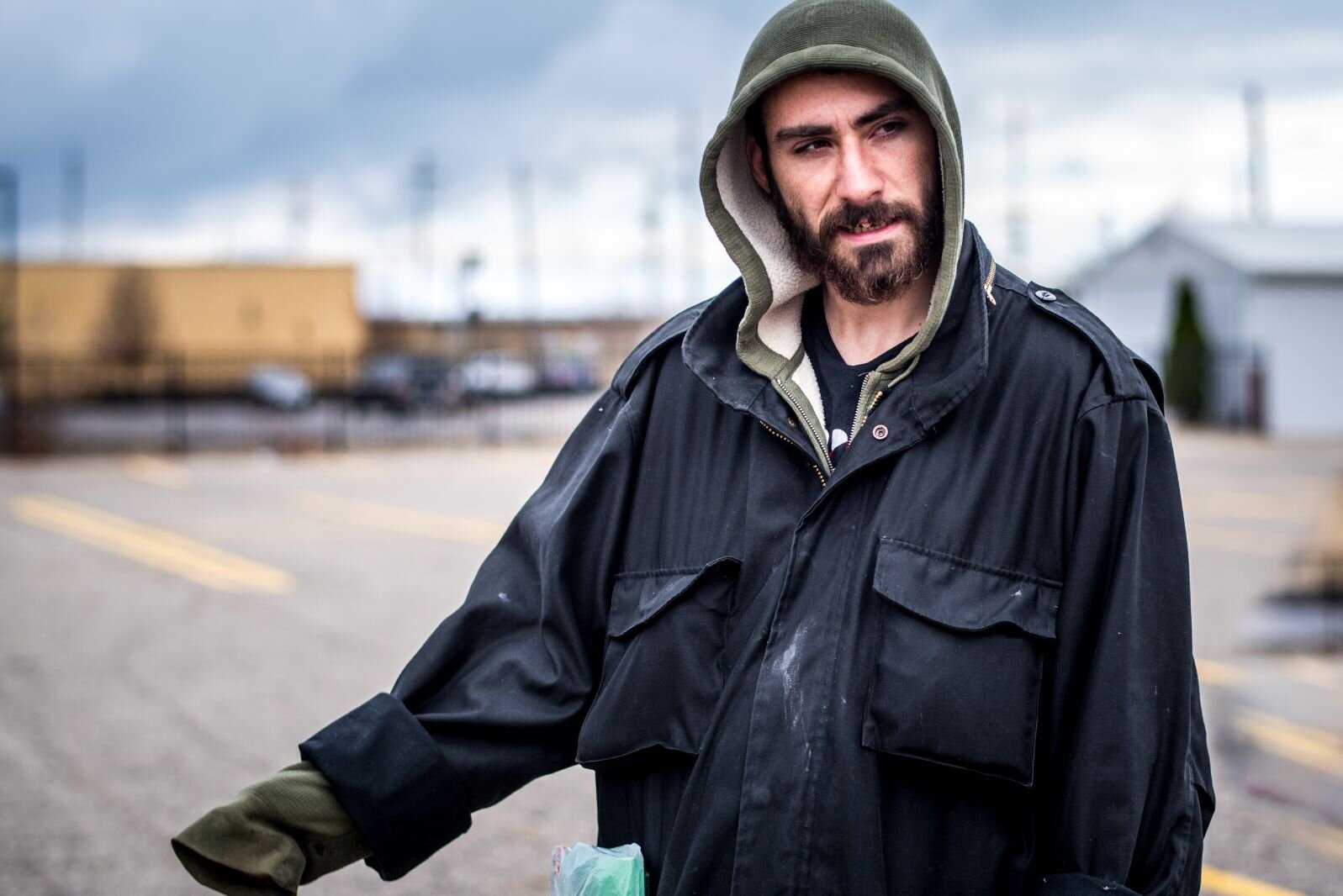
“This is my second job after retirement,” he tells us.
He earned a Ph.D. in statistics at Iowa State University in 1985 and came to Portage to work for The Upjohn Co. Van Schaik stayed through all the changes at the company, which was ultimately acquired by Pfizer Inc. He recently retired as a process performance analyst at Pfizer.
When he first came to the area, “what struck me was the disparity in the wealth between Portage and the Northside,” he says. “How can such a rich community have such a desperately poor Northside?”
He describes himself as a “very strong Catholic.” He thinks of his past life, which he saw in terms of common stability — “I was born of a good family. You do well in school. You go to college, grad school, … get a job, raise a family … .” He prayed on what he wanted his life to be like, “and with God, we filled in the colors.”
In the same way, he thought about what he’d like his retired life to be like. “I’d like to hike the Appalachian Trail. I’d like to bike through the 48 contiguous states. I had all of these things I wanted to do — and I still want to do them, don’t get me wrong.”
He prayed on it — “Well, God, why don’t I give you the marker? It became clear to me that those things I wanted to do were fine and dandy, but that’s not where my vocation career is.”
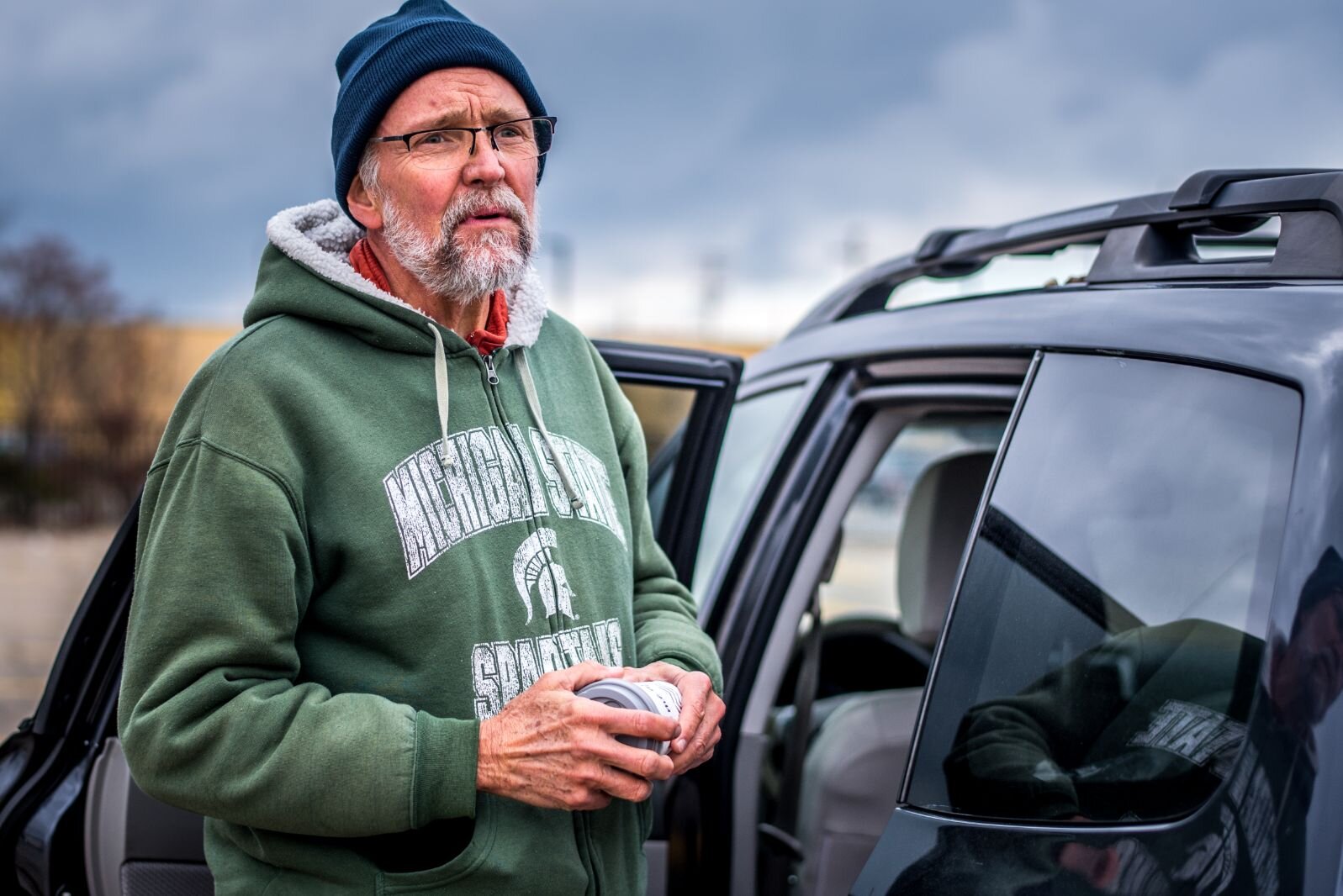
Through the St. Vincent De Paul Society, he began serving meals outside of the PFC. He volunteered in the Gospel Mission’s kitchen. At the Salvation Army’s warming center last winter, his volunteer work “snowballed. Before you know it, I was sitting there three days a week, just handing out water and granola bars.”
The volunteer says he also started work at the Gospel Mission’s Idea Center, providing help in continuing education. “And so I got to meet people like Sam and other people there.”
Seeing Sam as Sam, Jamie as Jamie, Tim as Tim
Sam, 21, was hanging out at van Schaik’s car, seemingly more for the company than for granola bars.
Sam credits van Schaik, other volunteers, and someone named Jeff (who we would soon meet), with “helping as I’m going through something here or there, helping me understand. They believe in everybody, man. Whether it’s someone who’s positive or negative.”
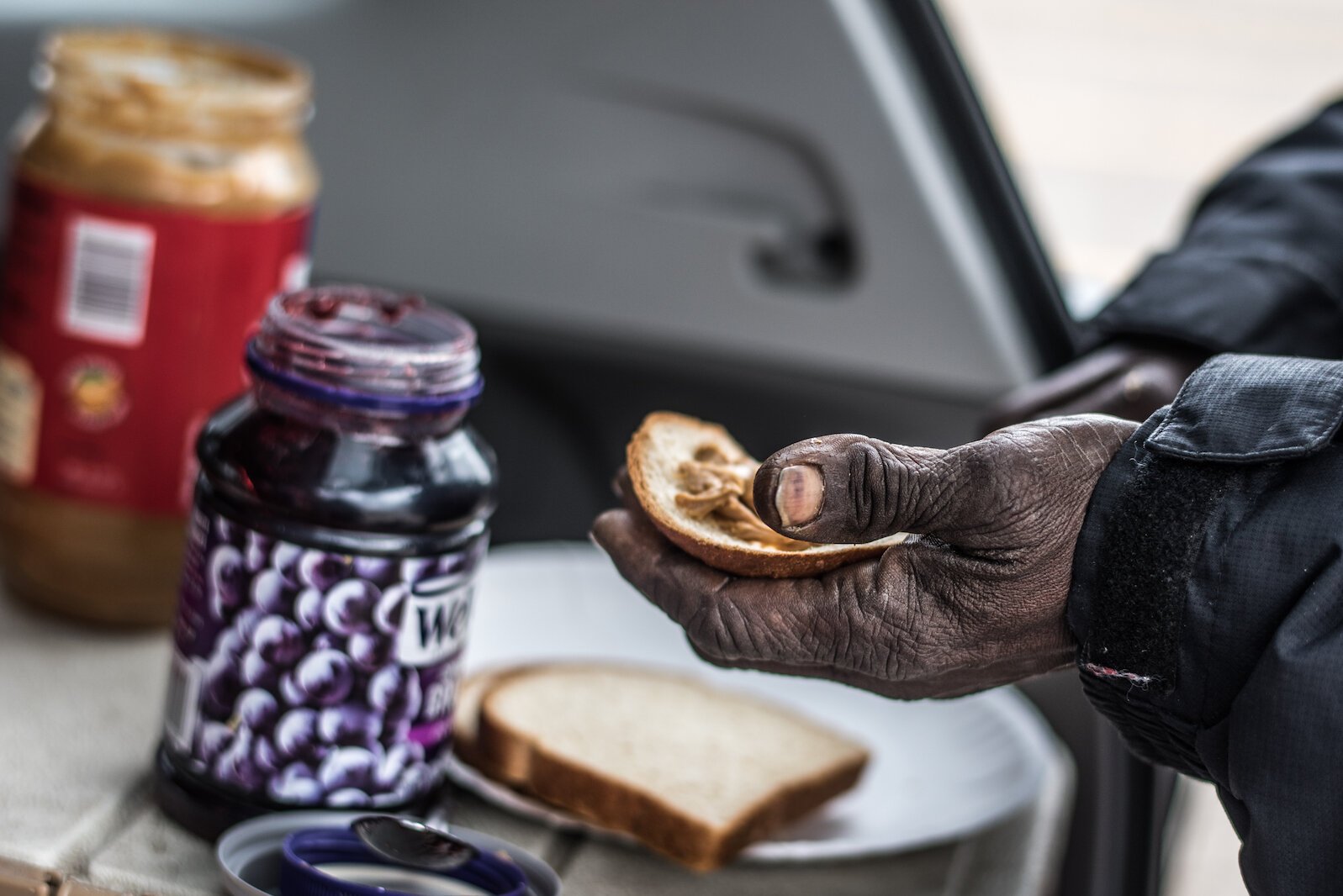
Sam says he got to where he is when he “dropped out of high school. I was screwin’ up.” He got into drugs. “I was just being childish, needed to grow up.”
Asked if he has a place to stay at night, he says “I’m in the shelter, but not in the shelter. Like, I stay outside.”
What do Kalamazoo’s unsheltered need? Sam answered, “Stability.” He’s hoping to get a construction job for the winter, just as a means of “finding a way to get inside.”
Van Schaik says that, apart from the obvious need for shelter, Kalamazoo’s homeless need to be seen as fellow humans. People might see them as simply, “the homeless,” but he calls them “friends.” As he works with them, “You get to know people. You get to know their names. It’s important to know their names,” he says.
“They’re folks like you and I. They all have a story. Nobody, when they’re 17, 18, says, ‘Boy I want to be a homeless addict.’ Nobody.”
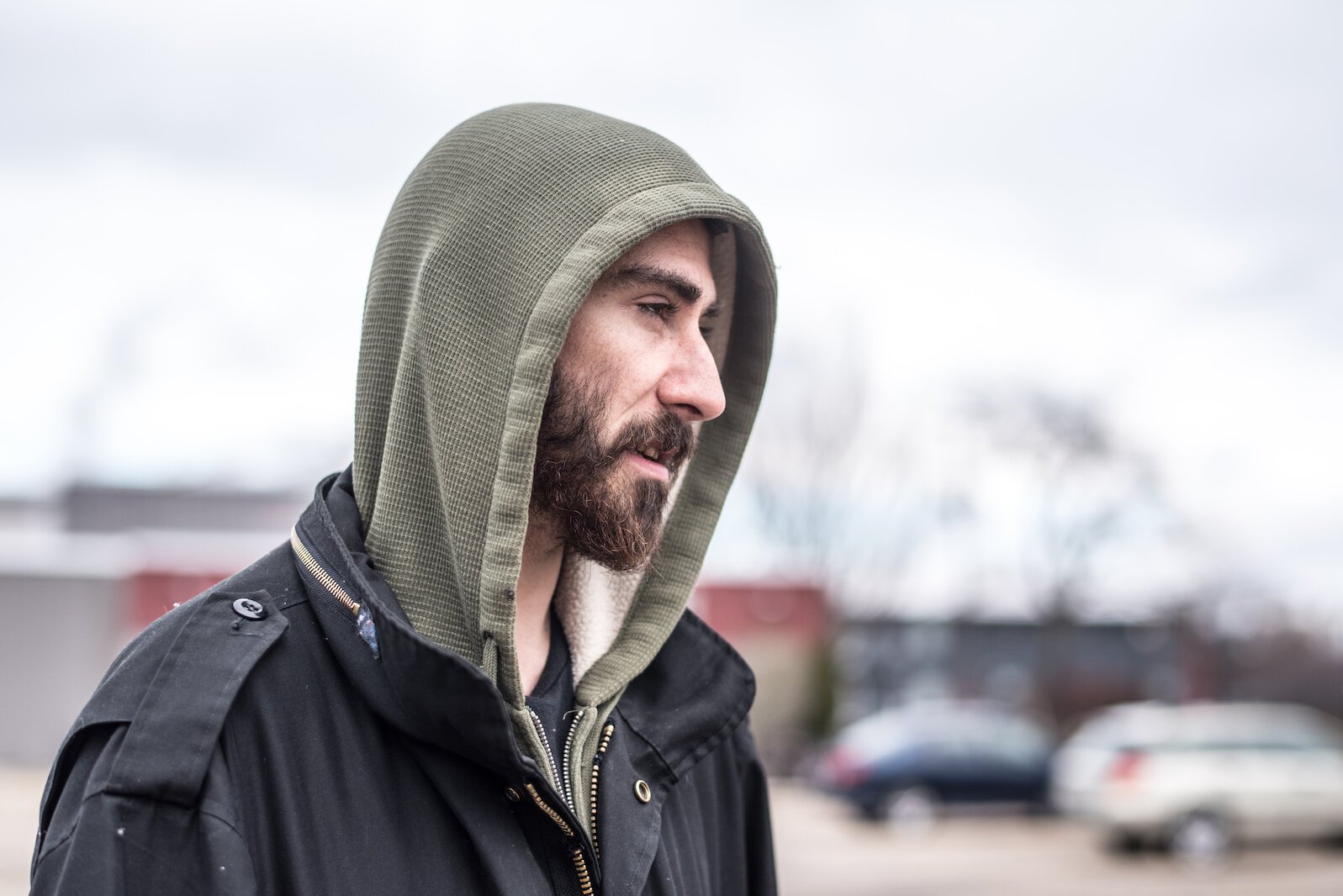
“So here I am. And I have no idea what I’m doin’, other than just smiling.”
Again, someone coming down the tracks walks up to his car. Van Schaik knows him, of course. “JD, you need something?”
Van Schaik has heard there are nearly 1,000 homeless people in Kalamazoo. “I know maybe about 200 people.”
Giving a “royal rip” about people
He suggests other volunteers for us to interview. Like Jeff, at the Idea Center. “He’s an interesting character to talk to. He’s like me. He’s a retiree.”
About 10 minutes later, Jeff Hirsch just happens to drive up.
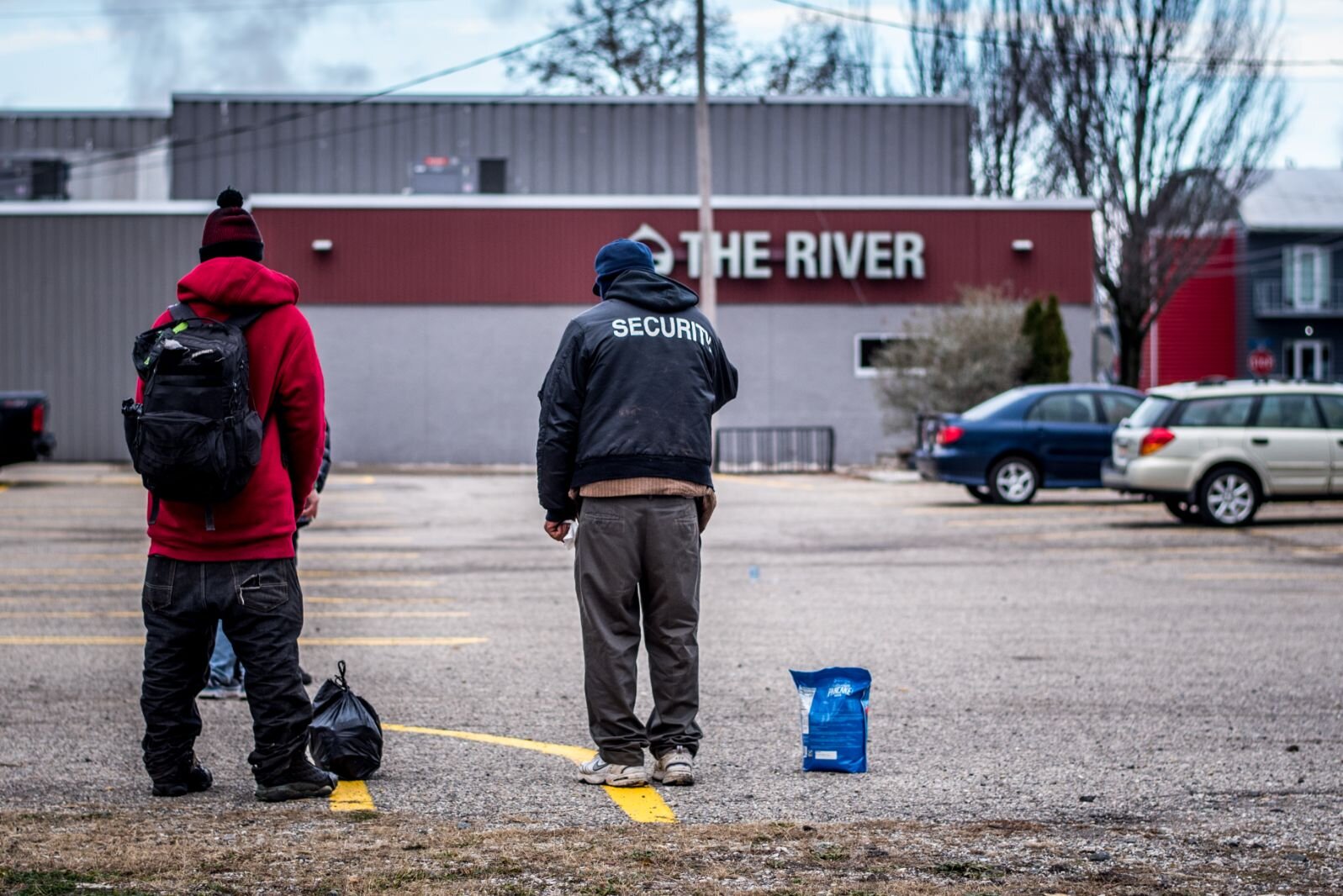
“I just wanted to see what he’s up to because he’s trouble,” Hirsch jokes.
Hirsch describes himself as a former Pringles potato chip salesman. He worked for P&G, then for Kellogg Co. “I’m an Italian from New Jersey, and I talk too fast, and I’m too loud.”
He volunteers at the Idea Center teaching classes on money management, workforce development, and conflict management. He also does a lot of simple one-on-one work with people at the Gospel Mission.
“You kind of fall in love with humans, just human beings,” Hirsch says.
He says that people desperately need some short-term shelter, plus food. But a big need, Hirsch says, is “the sense that someone gives a royal rip about them, above and beyond just the government writing them a check. That’s where my faith comes in. So many people have nobody, they’ve made poor decisions, they have no family, and I find that love conquers it. I’m not trying to get mushy, but people need to know that somebody cares.” That “even if they mess up, it’s okay.”
Faith is a big motivator for Hirsch and van Schaik. Hirsch says, “You can preach to people, but what are you doing? I can tell you all the wonderful things, but if I’m not doing it — well, I’d rather see a sermon than hear one.”
Van Schaik says, “You gotta do it. To me, God speaks through the people, but — how do I say this — I was called to be out here… I don’t sit here and overtly proselytize, but I think through my actions people recognize that there’s compassion. That’s my faith.”
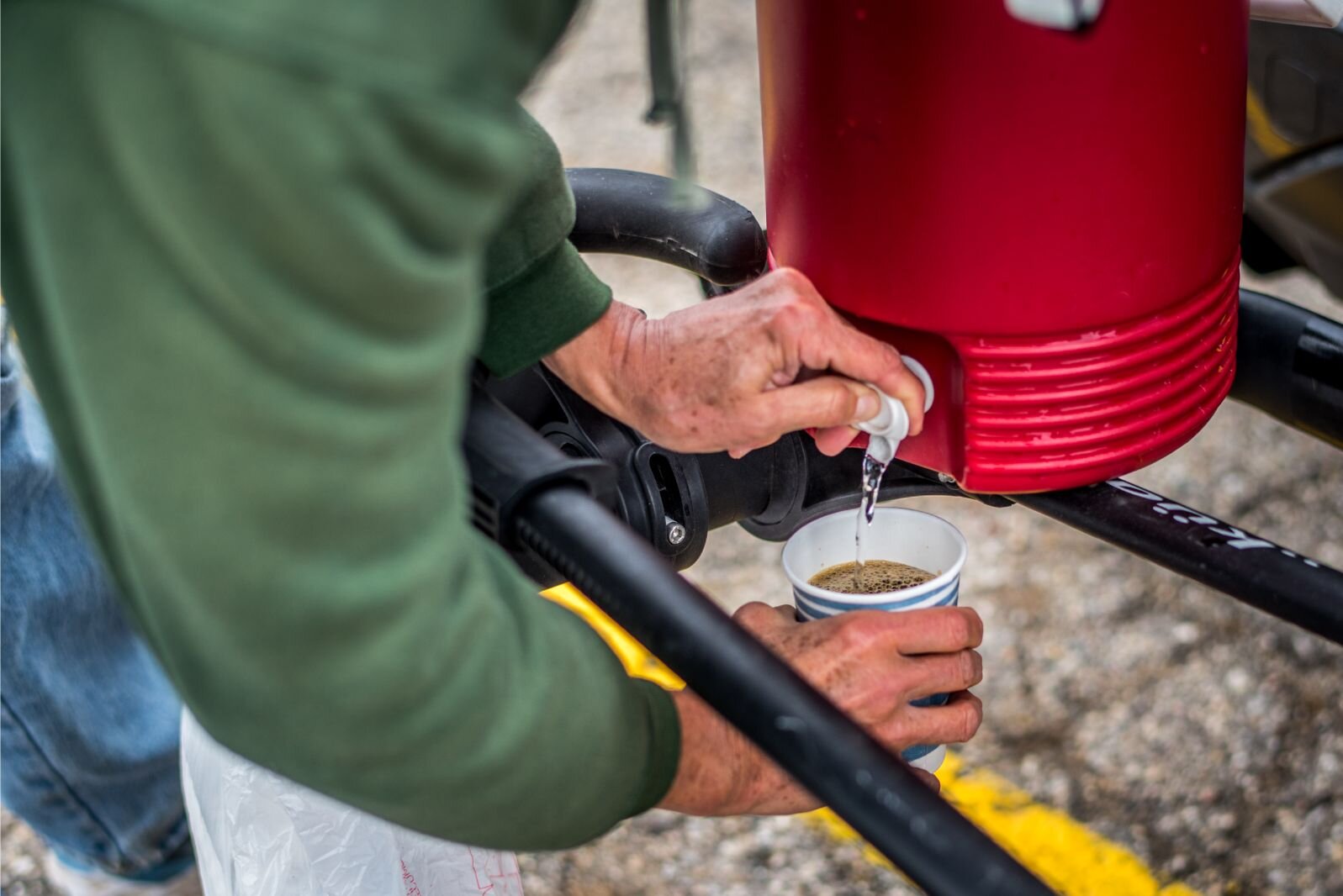
Hirsch adds that it’s “messy” work. “There are messy days, and things break your heart, and make you sad, make you cry. But then you see the little glimmers if someone makes a good step forward or does some good things. I’ve had lots of them, and a lot of people still aren’t there. But that’s okay, too. I can’t fix anybody, right?”
Van Schaik walks back to his car to help someone find a sandwich. Hirsch says, “He’s amazing, this guy. I’m more of the one-on-one relationship-building work. He’s out here doing things I’ve never done.”
Hirsch left. Snowflakes began falling again.
Van Schaik says, “We can talk about housing, and housing is really important, they need that. They need mentoring, and things like that. I think the most important thing, as Jeff said, they need to know that somebody cares, who’s there for them no matter what.”
“We all screw up. I’ve been blessed with wonderful parents. I screwed up, and they were behind me. They had to kick me in the rear a couple of times real hard, but okay.”
“One of our friends is in jail. Man, he comes out, the first thing I’m going to do is hug him, and then kick him,” he says.
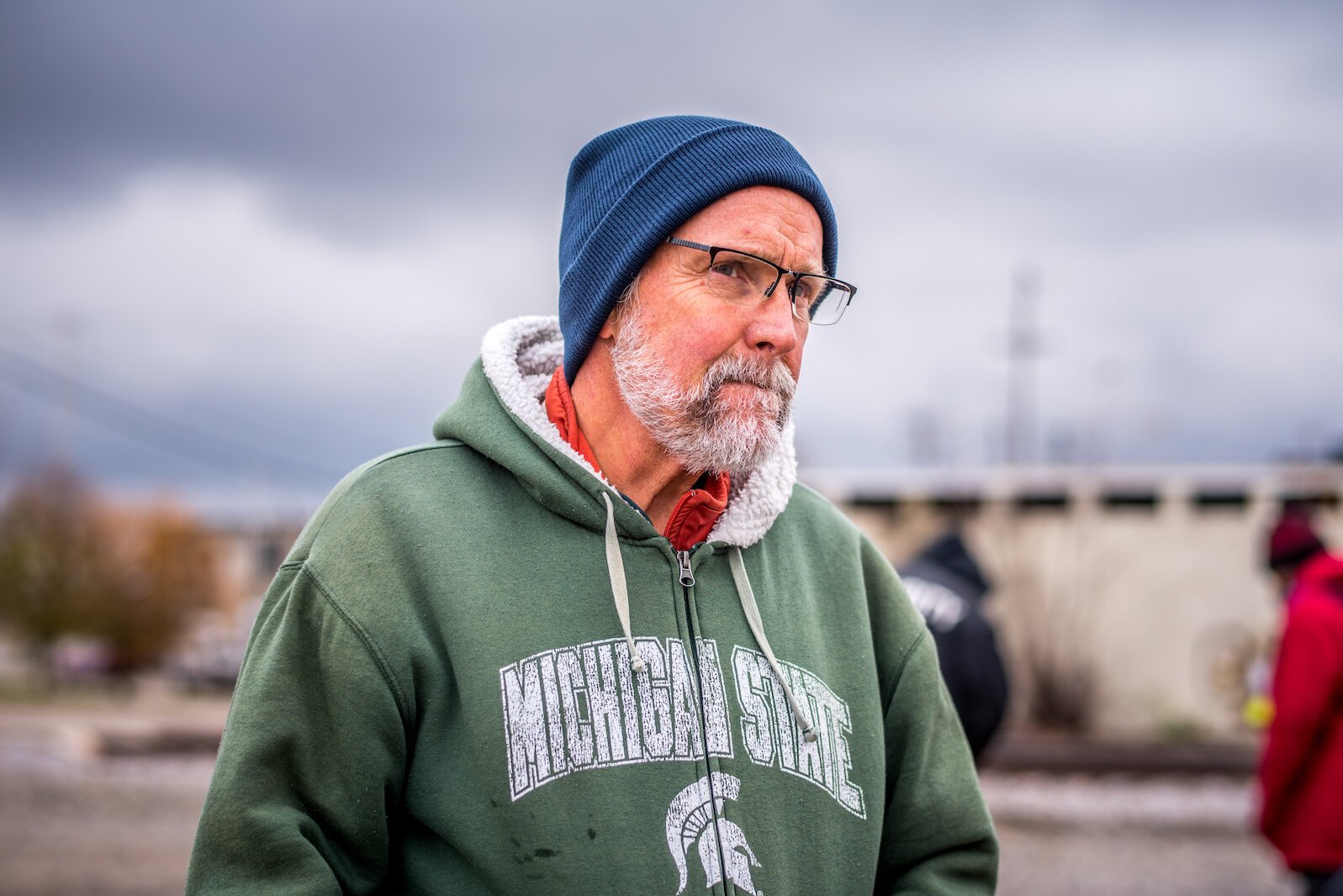
He heard from another homeless friend. “Boom, he’s also in jail. The interesting thing is, he reached out to me. He reached out to his social worker, said, ‘Get ahold of Jan. Let him know where I am.'”
After the storm
Van Schaik wrote us on Nov. 23 to say, “Everyone I know made it through the storm. Some inside, many outside.”
He heard that one person, who he doesn’t know, froze to death in MLK Park the night the storm hit. (The Kalamazoo Department of Public Safety confirmed that a person found in MLK Park on Nov. 17 was taken to a local hospital and was later reported to have died there.)
Some people van Schaik knows rode out the storm at the Gospel Mission. He helped one person find another shelter, and with two others, “Who knows where they ended up.” He says he’s since seen those two on the streets after the storm. So they survived.
“The warming shelter at the Salvation Army, which is a distance from downtown (on Burdick near Reed in Edison), had a good number of people there Friday,” he writes. “Today (Wednesday) I was behind The River and about 10 people showed up. It was wonderfully warm (high 40s, low 50s), not the biting wind of last week.”
Van Schaik makes sure his friends know his schedule: Tuesdays at the Salvation Army, Wednesdays and Thursdays at The River parking lot. “Simply so that they know where to find me. As I told you, what I think is of first importance, is that they know there is someone who cares for them, and where they can get ahold of this person in case of need.”
(Second Wave asked The River and ISK whether they were teaming up to host a warming center at the church this year and they both replied. ISK senior executive Dianne Shaffer wrote, “We are hoping to open the alternative day shelter at The River again this year. We are currently working to secure funding for it.”
The River wrote that they “planned on hosting a warming shelter run by ISK starting Nov. 15, but they pulled out. They let us know on the 15th that they aren’t able to currently provide a warming shelter, and if they did one at our location, it wouldn’t be until after Thanksgiving or maybe a couple weeks into December. So we are hopeful that we will have one soon because there is a huge need.”)

